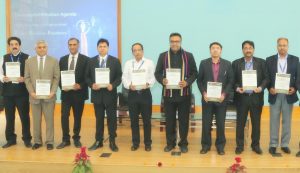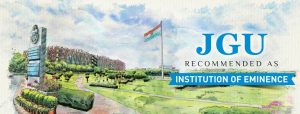New Delhi, May 21, 2016: Revisiting holocaust and other abhorrent genocides in world history, and the factors that led to such episodes of mass violence, is important to prevent recurrence of such events in future, concurred experts at a major international conference held at O. P. Jindal Global University (JGU) here.
The two-day conference on ‘Mass Violence & Memory’ was organized by the Jindal Centre for Israel Studies based at Jindal School of International Affairs in association with the United States Holocaust Memorial Museum, the Middle East Institute at New Delhi & Society for Social Regeneration & Equity.
Attended by academicians, Genocide Studies scholars and Holocaust Studies experts from across the world, the conference deliberated in detail about the causes and factors that have led to situations of mass violence in history – use of propaganda to demonize a group of people, exploitation of cultural nationalism, hate speech, denial of human rights, mass atrocities and suppression of facts, among others. The speakers also touched upon several abominable episodes of mass violence in recent history and underlined the need for instituting dedicated studies on these subjects.
Dr. Sreeram Sundar Chaulia, Dean, Jindal School of International Affairs said over the years varying scales and magnitudes of mass violence have attracted a range of definitions and nomenclatures and triggered debates about their usage. “The aftermath of mass violence is just as troubling as mass violence itself,” he said, pointing to the debates, assertions, justifications, obliterations and denials that follow as societies try to make sense of their brutal degradation.
Professor David Patterson, Hillel Feinberg Chair in Holocaust Studies, University of Texas spoke at length about the unquestioned operation of the Auschwitz concentration camp from 1942 to 1944 where almost 1 million Jews were sent to gas chambers by German authorities of the Third Reich.
Additionally speakers at the conference underlined the need of promoting large scale studies of these violent episodes in history, their scales, and factors that led to the atrocities. The experts agreed that muted international response, denial or minimization, resistance to genocide and mass atrocities have been major causes of mass violence in the past that have led to troublesome memories. They concurred that educating students about our collective troubled past and its memories is an important deterrent to repeating of history.
However, Dr. Dan Porat, School of Education, Hebrew University of Jerusalem pointed out at another aspect of Holocaust education in Israel and the inappropriate projection of Holocaust to the children who are taught about it right from kindergarten through storybooks, textbooks, ceremonies, memorial days, museum visits and witness account. “All these means focus on communicating to students of the survivors thereby inculcating a deep sense of victimization. The curricula focus on factors and social circumstances that motivated the perpetrators to commit such horrendous crimes. Thereby, it only helps Israel to produce more soldiers who would defend their country at all cost, leaving behind the true essence of holocaust,” he said.
Supporting Dr Porat, Prof Suzanne Rutland, Emerita, Department of Hebrew, Biblical and Jewish Studies, University of Sydney concluded the conference by stressing on the need to include Holocaust in the curricula with a more holistic approach. “Holocaust is a genocide that would promote excitement to hate and kill, to which the current holocaust education becomes a template. Therefore, in academics, while there is a need to highlight the issues of holocaust, its presence in the textbooks would keep reminding the danger of forgetting it. We need to equip and educate the educators first with complete knowledge and nuances of holocaust.”
Other scholars touched upon more recent episodes of mass violence in history.
Dr. Ran Shauli from The Hebrew University of Jerusalem discussed the ethnic war which occurred during the Japanese occupancy of Malaya and the ensuing Malayan emergency, ranging from a period from 1941 to 1960, involving Chinese, Malays and Indian groups of population.
In addition to a roundtable on Holocaust Education with experts from across the world the conference altogether had ten panels focused on a range of themes, viz., Mass Atrocities, Memory, Responses, Conflicting Narratives, Displacement, Refuge, Reconciliation, etc. India figured prominently throughout the conference, with discussions on several episodes of mass violence in India, right from the partition in 1947. Literary responses to mass violence (like Amitav Ghosh’s The Hungry Tide and Hasan Ajijul Haque’s Agunpakhi) and the denial and/or minimization of incidents of mass violence were also discussed.
The conference saw the participation of scholars from thirteen different countries along with a strong presence of Indian scholars from multiple disciplines from different parts of the country interested in mass violence studies. A presentation on Polish Refugee Children in India during the Holocaust was also found to be very interesting.
Scholars who participated in the conference included Dr. Adam Sutcliffe, Head, Department of History, King’s College, University of London; Dr. Krista Hegburg, Program Officer, University Programs Division of the Jack, Joseph and Morton Mandel Center for Advance Holocaust Studies, US Holocaust Memorial Museum; Tali Nates, Director, Johannesberg Holocaust and Genocide Centre; Karel Fracapane, Senior Project Officer, Focal Point for Holocaust Education, Section of Education for Sustainable Development and Global Citizenship & Division for Inclusion, Peace and Sustainable Development, UNESCO; among others participants


